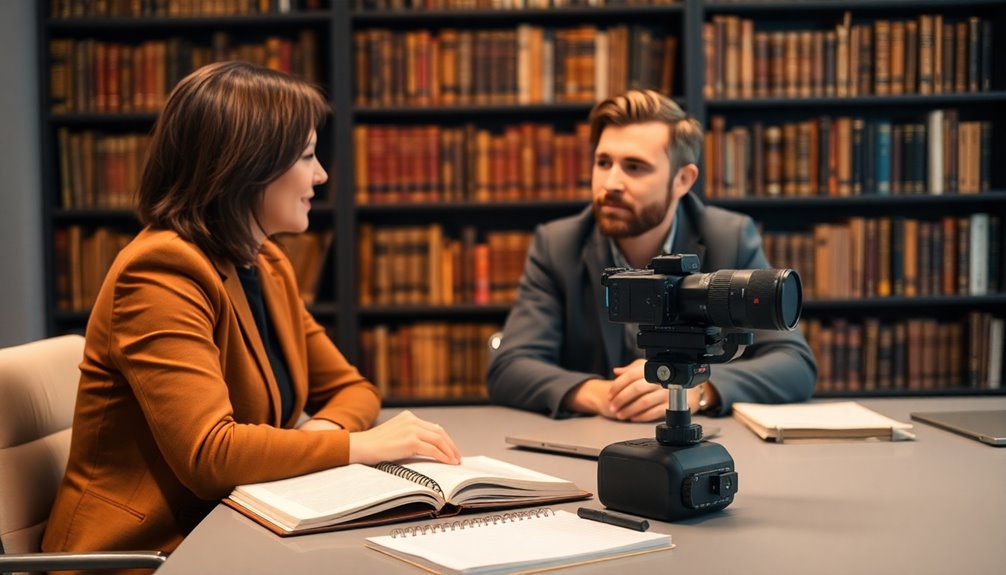To boost your confidence and performance in job interviews, start by thoroughly understanding the job description and researching the company. Dress professionally to make a strong first impression, and master your body language for better engagement. Practice answering common questions and prepare thoughtful inquiries to show your interest in the role. Managing nervousness through mindfulness and mock interviews can further enhance your readiness. Remember, punctuality and a confident demeanor communicate your commitment and value. By implementing these techniques, you can set yourself apart and increase your chances of success. There's plenty more to explore on this topic!
Key Takeaways
- Understand the job description thoroughly to tailor your responses and showcase relevant skills during the interview.
- Research the company's mission and values to align your experiences with their principles, demonstrating genuine interest.
- Prepare thoughtful questions about the role and company challenges to illustrate your initiative and engagement.
- Practice effective communication skills by using specific examples and maintaining clear, moderate speech throughout the interview.
- Utilize mock interviews to simulate real conditions, receive constructive feedback, and build confidence in your responses and presentation.
Understanding the Job Description
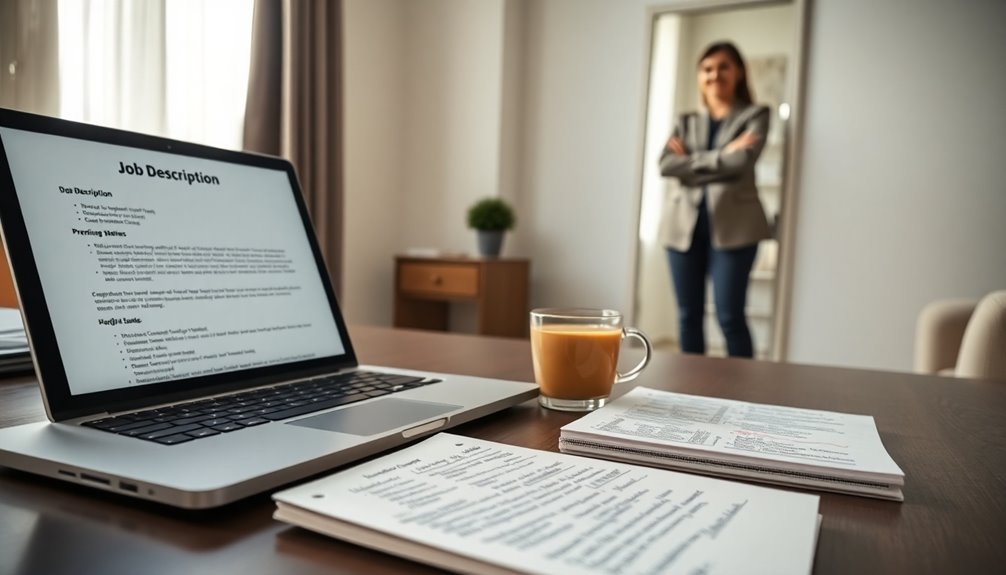
Understanding the job description is essential for your interview success. When you read the job description multiple times, you can spot and highlight the skills and experiences that are relevant to the role. This process allows you to tailor your responses during the interview, aligning them closely with what the employer expects.
Take time to reflect on your past experiences that directly correspond to the key responsibilities and required qualifications outlined in the job description. Doing this not only boosts your confidence but also prepares you to answer specific interview questions more effectively.
Additionally, familiarize yourself with any industry-specific terminology and requirements mentioned in the job description. This knowledge enhances your communication during the interview, making you sound more in-tune with the industry.
Moreover, analyzing the job description for potential challenges and the company's needs can give you an edge. It equips you to propose informed solutions, showing that you understand what the company seeks. By investing time in understanding the job description, you set yourself up for a successful interview and increase your chances of landing the job.
Researching the Company

To impress in your interview, you need to know the company's mission and values as well as any recent news or developments. This knowledge will help you tailor your answers and show how your goals align with theirs. When you understand what drives the company, you can make a stronger case for why you're the right fit.
Company Mission and Values
Aligning with a company's mission and values is essential for candidates aiming to make a strong impression during interviews. When you research a company's mission statement, you gain valuable insights into its long-term goals and priorities. This knowledge allows you to tailor your responses and questions, demonstrating your understanding of what drives the organization.
Delving into a company's values helps you connect your personal experiences and achievements to those principles, making your candidacy more compelling. You can showcase how your background reflects the company's values, reinforcing your fit within their culture.
To gather this vital information, utilize the company's website, social media platforms, and recent news articles. These resources can reveal current initiatives that highlight the organization's mission and values, allowing you to speak confidently about them during your interview.
Being well-versed in a company's mission and values not only prepares you for potential questions but also enables you to ask insightful questions yourself. This shows your genuine interest in both the role and the company culture, setting you apart from other candidates. Prioritize this research, and watch your confidence soar!
Recent News and Developments
Staying updated on recent news and developments about a company can greatly boost your interview preparation. When you research these aspects, you gain insight into the company's current market position and strategic goals. This knowledge allows you to tailor your responses during the interview effectively.
Pay attention to recent earnings reports, product launches, or corporate partnerships; these can serve as valuable talking points that showcase your genuine interest. Additionally, being familiar with the company's involvement in social issues or community initiatives helps you align your values with its culture and mission.
Understanding the competitive landscape and recent industry trends is equally essential. It enables you to articulate how your skills can contribute to the company's success, especially in overcoming challenges.
Don't forget to engage with the company's social media channels and press releases. This engagement provides insights into the company culture and employee perspectives, equipping you with thoughtful questions for your interview. By focusing on recent news and developments, you'll present yourself as a well-informed candidate, setting you apart from the competition.
Importance of Punctuality

Punctuality plays an essential role in how interviewers perceive you from the moment you arrive. Being on time showcases your time management skills and sends a message about your commitment to the opportunity. Remember, first impressions matter, and showing up early can set a positive tone for the entire interview.
First Impressions Matter
Making a strong first impression is vital in a job interview, and arriving on time plays a key role in that. First impressions matter, and punctuality demonstrates your commitment and genuine interest in the position. When you arrive on time, you not only set a professional tone but also show that you value the interviewer's time.
Being punctual allows you to relax and mentally prepare, which can greatly reduce anxiety. This preparation enhances your performance during the interview. Research indicates that candidates who arrive early are often perceived as more organized and committed, positively influencing the interviewer's perception of you.
Punctuality is important for both in-person and virtual interviews. For virtual settings, verify you test your technology and establish a conducive environment ahead of time. This proactive approach reinforces the importance of first impressions and showcases your attention to detail.
Ultimately, establishing a professional tone through punctuality sets the stage for a constructive dialogue. By prioritizing your arrival time, you increase the likelihood of a favorable outcome, making it clear that you are a serious candidate ready to take on the challenges of the role.
Time Management Skills
When you arrive on time for an interview, you not only demonstrate your commitment but also showcase your effective time management skills. Being punctual creates a positive first impression, allowing you to mentally prepare and relax before the interview starts. Studies show that candidates who arrive late are often perceived as less professional, which puts you at a disadvantage.
To improve your time management, set a goal to arrive at least 10-15 minutes early. This strategy can help alleviate stress and guarantee you're ready to engage with the interviewer confidently. Remember, punctuality applies to both in-person and virtual interviews, reinforcing its importance in all professional settings.
Here's a quick comparison of punctuality vs. lateness:
| Punctuality | Lateness |
|---|---|
| Positive first impression | Negative first impression |
| Demonstrates time management | Suggests poor time management |
| Allows for mental preparation | Increases stress level |
Professional Attire
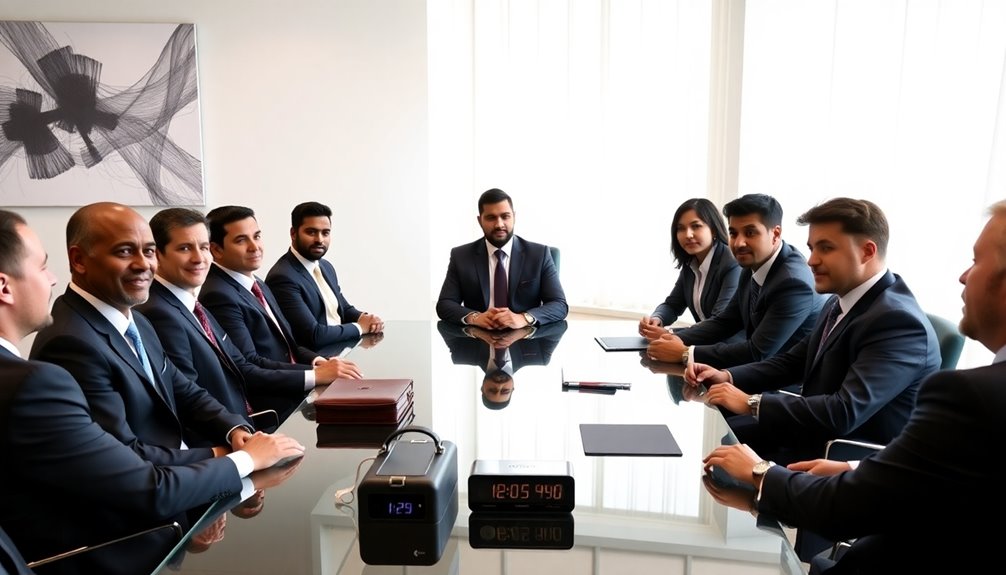
Choosing the right professional attire for a job interview can make a significant difference in how you're perceived by potential employers. First impressions matter, and your outfit can boost your self-confidence and show that you respect the interview process. Research the company's culture to select appropriate clothing. For a corporate setting, a conservative outfit is often best, while a tech startup may allow for a more casual look.
If you're unsure about the dress code, opt for formal attire like a tailored suit for men or a professional dress for women. Such choices convey professionalism and can help you stand out positively. Remember, wearing well-fitted, clean, and neatly pressed clothes enhances your perceived professionalism and attention to detail, leaving a lasting impression on interviewers.
When it comes to accessories, keep them minimal and tasteful to avoid distractions. You want the focus to be on your qualifications and responses, not on flashy jewelry or bold patterns. By carefully considering your professional attire, you'll not only feel more confident but also make a strong impression that reflects your seriousness about the opportunity.
Mastering Body Language

Mastering body language is vital for conveying confidence and professionalism during a job interview. Start by maintaining balanced eye contact; this shows engagement and helps establish a positive rapport with your interviewer. Sitting up straight is another important aspect of body language, as it demonstrates readiness and professionalism. Avoid slouching, which can create a negative impression.
It's essential to minimize distracting movements, like fidgeting or playing with your hair. These habits can undermine the calm and confident image you want to project. A firm handshake at the beginning of the interview sets a professional tone and creates a strong first impression, reinforcing your confidence and approachability.
Additionally, use effective gestures that complement your spoken words. This not only enhances your message delivery but also makes your communication more engaging and impactful. Remember, your body language communicates just as much as your words do. By mastering these elements, you'll greatly improve your chances of making a lasting impression and showcasing your suitability for the role. So, practice these techniques before your interview to guarantee you're ready to shine.
Effective Communication Skills

Effective communication skills are essential for success in a job interview, as they bridge the gap between your qualifications and the interviewer's expectations. To enhance your confidence level, actively listen to the interviewer's questions. Make certain you fully understand them before responding; this helps prevent miscommunication and shows your engagement. Speak clearly and at a moderate pace to guarantee the interviewer can follow your thoughts easily.
When discussing your experiences, use specific examples to illustrate your skills. This not only provides context but also makes your qualifications more relatable and memorable. Avoid filler words like "um" or "like" during your responses, as they can detract from your professionalism and clarity.
Additionally, pay attention to the interviewer's tone and style. Adapting your communication to match theirs can foster rapport and create a more comfortable dialogue, allowing you to express your qualifications more effectively. By honing these effective communication skills, you boost your confidence level and improve your overall performance in the interview. Remember, clear and engaging communication can set you apart from other candidates and leave a lasting impression. Moreover, practicing these techniques in a Speakers Boot Camp can significantly enhance your public speaking abilities and overall confidence.
Developing a Positive Mindset

To succeed in your job interview, embracing growth opportunities can transform how you view challenges. Cultivating resilience and positivity helps you bounce back from setbacks, while practicing gratitude regularly shifts your focus to what you appreciate in the process. Together, these strategies create a powerful mindset that enhances your confidence and performance.
Embrace Growth Opportunities
Many candidates find that embracing a growth mindset can transform the way they approach job interviews. By viewing challenges as opportunities for learning, you can enhance your performance and reduce anxiety. Research shows that maintaining a positive attitude not only calms your nerves but also leads to clearer communication during interviews.
To cultivate this mindset, consider these strategies:
| Strategy | Benefits |
|---|---|
| Mindfulness Practice | Reduces anxiety and promotes calmness |
| Visualization Techniques | Increases focus and confidence |
| Self-Reflection | Boosts self-esteem and articulates strengths |
| Challenging Negativity | Fosters resilience and self-belief |
| Continuous Learning | Encourages adaptability and growth |
Recognizing and challenging negative thoughts about yourself is essential for building a strong impression. Engaging in self-reflection helps you identify your personal strengths and achievements, empowering you to articulate your qualifications confidently. By embracing a growth mindset, you not only prepare yourself for interviews but also develop skills that will serve you throughout your career. Additionally, incorporating visualization techniques can enhance your confidence and focus during interviews. Make the most of these opportunities, and watch your confidence soar!
Cultivate Resilience and Positivity
Cultivating resilience and positivity is essential for maneuvering the job interview process with confidence. A positive mindset can considerably influence your success. When you approach the interview with confidence and a can-do attitude, you engage more effectively with interviewers and showcase your skills more clearly.
Consider smiling during the interview; it not only creates a favorable impression but also helps reduce nervousness, fostering a relaxed atmosphere. Incorporating deep breathing techniques can promote relaxation, enabling you to approach the interview with a clearer mindset.
Instead of fixating on the outcome, focus on the opportunity at hand. This shift in perspective can alleviate pressure and enhance your performance, allowing you to present your best self.
Visualization techniques can be particularly powerful. Imagine yourself succeeding in the role you desire. This practice strengthens your self-belief and helps cultivate resilience, making you more adaptable during the interview process. Additionally, practicing positive visualization techniques can enhance your ability to stay calm and focused under pressure. By actively fostering positivity and resilience, you'll find that you can navigate the job interview landscape with greater ease, leaving a positive impression that stands out to potential employers.
Practice Gratitude Regularly
Practicing gratitude regularly can turn your focus away from anxiety and self-doubt, helping you embrace a more positive mindset as you prepare for interviews. When you actively acknowledge the good in your life, you shift your perspective. This shift enhances your overall mental well-being, which is essential for boosting your confidence before a high-pressure situation like a job interview.
Studies reveal that expressing gratitude increases happiness and reduces stress, making it easier for you to perform well under pressure. One effective method is to keep a gratitude journal. Each day, jot down things you're thankful for, reinforcing a positive mindset that elevates your self-esteem.
Regularly recognizing your personal successes and the support from others fosters resilience, empowering you to present yourself positively during interviews. Try engaging in gratitude exercises, such as writing thank-you notes or reflecting on uplifting experiences. These practices create a sense of connection and optimism, both crucial for your interview performance. By making gratitude a habit, you'll not only boost your confidence but also cultivate a mindset that invites success. Additionally, incorporating mindfulness practices into your gratitude routine can further enhance your emotional regulation and self-awareness.
Avoiding Desperation

Desperation during a job interview can severely undermine your chances of success. When you come across as desperate, you might rush your responses or settle for unfavorable terms, which can leave a negative impression on interviewers. Instead, focus on avoiding desperation by maintaining a casual demeanor. This approach not only conveys confidence but also helps you appear less enthusiastic for the position.
Articulate your responses assertively and clearly. It's crucial to express your skills and qualifications with conviction, showcasing your value rather than merely agreeing to anything that comes your way. By displaying a sense of demand for your expertise, you position yourself as a desirable candidate, thereby contrasting with the negative perceptions tied to desperation.
Additionally, practicing self-reflection can help you recognize your worth. Embrace a positive mindset and remind yourself of the unique skills you bring to the table. This self-awareness will reduce feelings of urgency during the interview process. Remember, avoiding desperation is key to presenting yourself as a confident and capable candidate who's not just looking for any job, but the right role for you.
Engaging With Interviewers
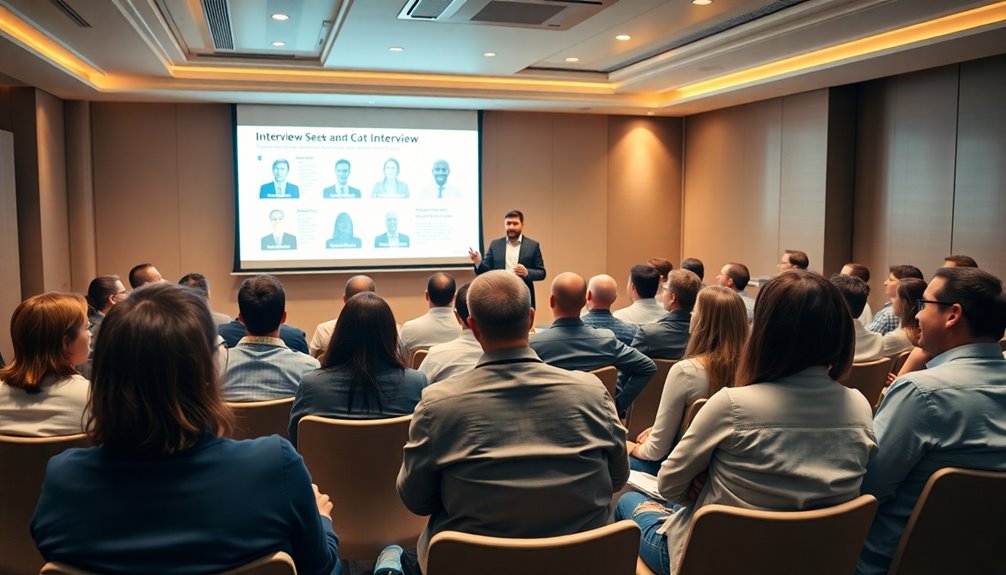
Maintaining a confident demeanor is just the start; actively engaging with interviewers can greatly enhance your chances of making a lasting impression. By fostering a genuine connection, you not only showcase your interest in the position but also clarify job expectations and company culture. Here are three effective techniques for engaging interviewers:
- Maintain Eye Contact and Posture: Keeping eye contact and a confident posture shows you're engaged and interested. This simple act can make a powerful impression on interviewers.
- Ask Insightful Questions: Prepare relevant inquiries that demonstrate your understanding of the company and role. This reflects thorough preparation and curiosity, setting you apart from other candidates.
- Follow Basic Etiquette: Start with a polite greeting, and don't forget to send a thank-you note afterward. These gestures create a favorable impression and can positively influence the interviewer's perception of you.
Preparing Thoughtful Questions

As you gear up for your interview, preparing thoughtful questions can set you apart and show your genuine interest in the role and the company. Insightful questions not only help clarify job expectations but also give you a glimpse into the company culture. This understanding allows you to determine if the organization aligns with your values and career goals.
Researching the company beforehand equips you with specific inquiries that reflect your understanding of their challenges and initiatives. This proactive attitude highlights your engagement with the role. Aim to have at least three prepared questions, as this illustrates initiative and creates opportunities for deeper conversations beyond standard interview questions.
Here's a quick guide to help you brainstorm:
| Type of Question | Example Question | Purpose |
|---|---|---|
| Role-specific | "What does a typical day look like for this position?" | Clarifies job expectations |
| Company culture | "How would you describe the team dynamics?" | Assesses company culture |
| Growth opportunities | "What opportunities for advancement are available?" | Understands career progression |
Managing Nervousness

Managing nervousness can be a crucial step in ensuring a successful job interview. It's completely normal to feel anxious; in fact, four out of five job seekers report experiencing pre-interview nerves. The key is how you handle those feelings. Moderate nervousness can give you an energy boost, but excessive anxiety may hinder your communication. Here are three effective strategies for managing nervousness:
- Preparation: Equip yourself with knowledge about the company and role. This preparation helps you feel more in control and boosts your confidence during the interview.
- Visualization: Take a moment to visualize yourself succeeding in the interview. Imagine maneuvering through questions smoothly and leaving a positive impression. This technique can calm your nerves and help you maintain composure.
- Physical movements: Engage in simple movements before entering the interview room. Twisting your spine or giving a genuine smile can relieve tension and foster a positive mindset.
Practicing Mock Interviews
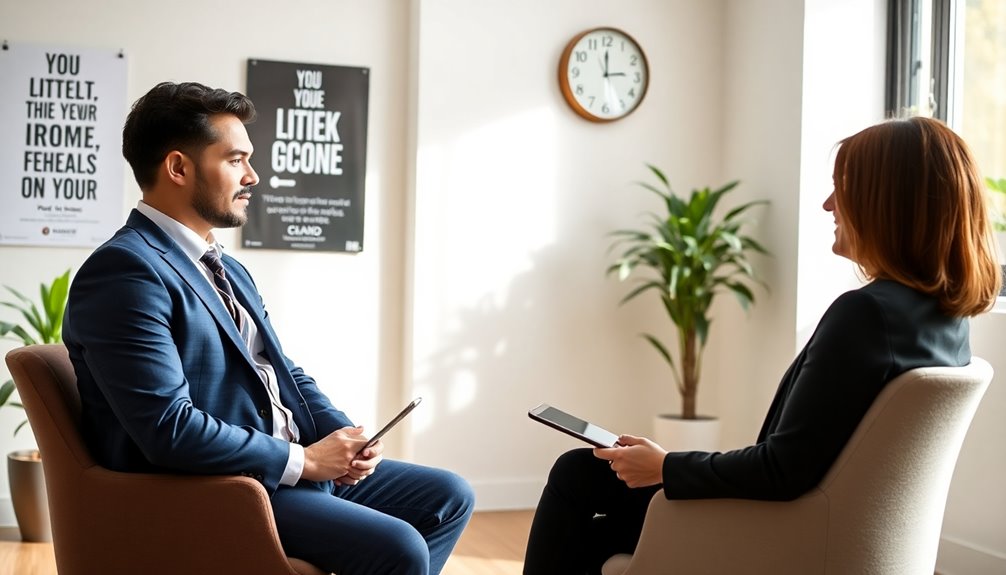
Practicing mock interviews can greatly enhance your confidence and performance in real job interviews. By simulating actual interview conditions, you can refine your responses and become more comfortable in a low-pressure environment. Engaging with friends or mentors during these sessions offers valuable feedback on your body language, tone, and content delivery, which are vital for effective communication.
Here's a simple breakdown of the benefits of practicing mock interviews:
| Benefit | Description | Outcome |
|---|---|---|
| Simulated Conditions | Mimics real interview scenarios | Reduces anxiety |
| Feedback | Receive constructive criticism from peers | Improved communication skills |
| Common Questions | Practice answering typical interview questions | More concise and relevant answers |
| Recording Sessions | Review your performance through recordings | Identify areas for improvement |
Regularly scheduled mock interviews help build your confidence over time. You'll feel better prepared and self-assured when facing actual interview scenarios. So, don't underestimate the value of practicing mock interviews; they're a game-changer for your interview readiness!
Frequently Asked Questions
How to Increase Confidence in Interviews?
To increase your confidence in interviews, start by reflecting on your strengths and past achievements. Use positive affirmations to combat self-doubt and enhance your self-esteem. Practice with friends or mentors to simulate interview conditions, allowing you to articulate your qualifications clearly. Familiarize yourself with common questions and rehearse concise answers. Finally, visualize yourself succeeding in the role, which can help you feel more at ease and ready for the interview.
What Are the Five C's to Remember in an Interview?
Did you know that 70% of interviewers decide on a candidate within the first five minutes? To make a strong impression, remember the five C's: Confidence, Clarity, Conciseness, Curiosity, and Connection. Display confidence in your abilities, communicate your thoughts clearly and succinctly, ask insightful questions, and build rapport with your interviewers. These elements can transform your interview experience and greatly enhance your chances of landing the job you want.
What Are 5 Tips for a Successful Job Interview?
To ace your job interview, research the company's culture and tailor your responses accordingly. Practice common questions using the STAR method to clearly highlight your experiences. Dress appropriately to make a strong first impression. Arrive early to calm your nerves and show respect for the interviewer's time. Ultimately, maintain positive body language, like good eye contact and open posture, to demonstrate confidence and engagement throughout the interview.
How to Ace an Interview in 2024?
To ace an interview in 2024, focus on showcasing your adaptability and problem-solving skills. Familiarize yourself with the technology used for virtual interviews, and maintain professional body language to convey confidence. Research the company's mission and values to tailor your responses effectively. Use the STAR method to structure your answers for behavioral questions. Finally, don't forget to send a personalized thank-you email afterward to reinforce your interest and leave a lasting impression.
Conclusion
By mastering these techniques, you'll walk into your next job interview like a rockstar ready to take the stage! Remember, understanding the job description and researching the company sets a solid foundation. Pair that with professional attire and confident body language, and you're golden. Don't forget to engage your interviewers and ask thoughtful questions. With practice, you'll manage any nerves and shine brighter than a thousand suns. Go out there and show them what you've got!


